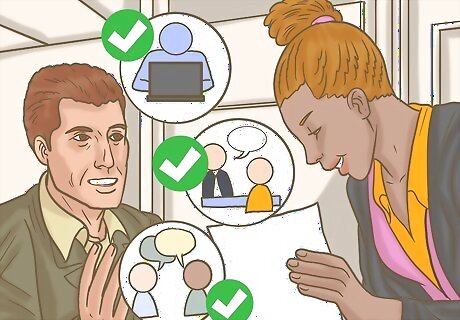
views
Getting Job Skills Training

Talk to a local shelter about opportunities for job training. A big challenge for homeless people looking for jobs is not having the right skill set. Go to your local shelter and ask what kinds of resources are available to help you learn applicable skills and find jobs. They might have courses right at the shelter, or they may be able to direct you to other aid organizations that can help. These training sessions might require an application, but are typically free. What can job skills courses teach me? Professional skills, like computer proficiency. Interviewing skills, like how to present yourself professionally and sell the job experience or skills you already have. Interpersonal skills, like dealing with workplace conflicts. These courses are run by homeless shelters, aid organizations, such as Chrysalis in Los Angeles, or state governments, such as Washington’s THRIVE program.

Check at churches if there are no programs at shelters. If you don’t feel comfortable asking for help from a shelter or an organization, you can turn to a local church. They may offer similar job skills courses, faith-based programs, or other kinds of help to get you back on your feet and in the workforce. Try attending a church service, then staying afterwards to introduce yourself to the pastor or priest. Explain that you’re trying to find a job and wanted to know if the church offered any programs to teach you useful skills or help you apply.

Attend every talk or training session you can. Try to get the most out of every training session that you attend. Listen closely, take notes, and ask questions when you don’t understand something fully. If you want, you can also talk to the speaker or teacher afterwards for more clarification or extra help. These training sessions are a great resource, so make the most of them! Learning these skills could be crucial to helping you get a job. If you have an idea of what kinds of jobs you’re most qualified for or interested in, try to go to sessions that seem applicable. For example, if you’re looking for an administrative or office job, you may want to attend sessions that focus on computer proficiency or workplace organization.

Get substance abuse help from social worker organizations, if you need it. It will be extremely difficult to apply for jobs if you’re using drugs, and employers won’t hire anyone who uses substances. If you need help with substance abuse, talk to a local homeless shelter or homeless aid organization. Many of the same organizations that offer job skills training also offer help for drug and alcohol abuse. Finding treatment may be difficult, but it’s the first step to getting a job and changing your life.

Inquire at shelters about housing opportunities to make job-hunting easier. Some states have programs for job-seeking homeless people that offer them apartment-style housing for free until they can start earning an income. In addition to giving you a boost of confidence, some independence, and a place to live, these programs also give you a legitimate address to tell employers. Ask a local homeless shelter or aid organization if your state offers a housing program for job-seeking homeless people.
Finding Opportunities and Applying

Use shelters and organizations in your area to find opportunities. The same shelters and organizations that offer job skills training sessions can also often help you find opportunities. Ask staff members at the shelter or organization about the kinds of opportunities that are available, and how you can start the application process. Contact the local homelessness coalition to find other programs that are available, such as Goodwill, Salvation Army, Catholic Charities, and services from other religious or poverty organizations that offer employment services. All of these programs have websites that explain what services they provide, who is eligible, and how to contact them.

Look for jobs online to broaden your search. If you want to look beyond the opportunities that a shelter or organization offers, head online. You can use a computer at a shelter or a public library to start running searches for the jobs you’re interested in. Narrow the searches down to your area to get results with the most potential. A good place to start is the US Department of Labor's website for federal programs for people experiencing homelessness. The Department of Housing and Urban Development's Homeless Assistance Program (HAP) for chronic homelessness also provides vocational services. You can search for jobs by simply googling something like “entry level office jobs in New York City” or “construction jobs in San Francisco.” You can also search on job websites like LinkedIn or Craigslist. Look for jobs that fit your experience and skill level, or that don’t require much experience. You might take a temporary job or an internship to get some money flow for the time being, then try to transition to a full-time position once you get a foot in the door.

Write up a resume to show employers your skills and experience. Your resume is the place to show potential employers that you have skills and experience that make you right for a job. Include your name, address, phone number, and email at the top of the resume, then list and describe your work experience in chronological order. If you don’t have much work experience, you can list volunteer jobs, school work, or other experiences that show that you have good work ethic. If you don’t have your own computer, write up your resume with an online word processor, like Google Docs, and save it to your email so you can access it from anywhere. If you can, ask staff at your local homeless shelter for help in crafting your resume. They can help you decide what to list and how to make the most of the experience you have.

Create an email account to apply for jobs. Email accounts are free, easy to make, and essential if you’re applying to jobs. Use a public computer at a library or shelter to create an account on Gmail or Yahoo and use it on your applications. Once you start filling out applications, check your email every 1-2 days to make sure you don’t miss any important messages. Use your full name in your email address and make sure it sounds professional, such as “[email protected].”

Use your last address or a PO box on your application forms. If the applications ask for an address, do your best to be as honest as you can. If you recently became homeless and still have mail forwarding, use your last address. If not, rent a cheap P.O. box at the post office or a UPS store that lets you use its street address for incoming mail. You can also ask at a homeless shelter to see if you can use their address on your forms.

Get a cheap cell phone and plan so jobs can contact you. Buy an inexpensive cell phone and ask to get a pay-by-the-minute plan, or purchase a prepaid phone card in cash. For either plan, you’ll only pay for every minute you talk on the phone. A cell phone is an essential form of contact when you’re applying for jobs. Keep the phone on you at all times in case potential employers call. Answer professionally, saying something like, “Hello, this is Mary,” and talk to them in a calm, quiet area.

Fill out applications as clearly and thoroughly as you can. Applications will at least require a resume and some personal information, like a name, address, phone number, and email. Others may ask for a cover letter or want you to fill out short online questionnaires. Write clearly and concisely, showing yourself in the best possible light and making sure employers know that you’re ready to work hard.
Interviewing for a Job

Buy professional-looking used clothing for interviews and keep it clean. Go to a Goodwill store or a thrift shop and look for the most modern, professional, well-kept clothes you can find. If you have a car, hang shirts or coats in the backseat or fold them nicely. Fold pants flat and place them somewhere where they won’t get dirty or rumpled. Try to buy at least 5 shirts and 2-3 pairs of pants. If you get hired, people might notice if you wear the same shirt twice in a week, but they won’t notice if your pants are the same. To keep your professional clothes from getting dirty, try keeping them in boxes or shopping bags.

Clean yourself in a public toilet or with wet wipes before an interview. Presenting yourself as clean and professional is crucial in an interview, but can be difficult when you don’t have a stable home, income, or bathroom. Do the best you can. Try to make sure you smell alright and don’t have visible dirt on your clothes or body. Cleaning Up Before an Interview Wear a clean shirt and slacks or a skirt. Comb your hair and smooth it so that it lays flat. You may want to trim the ends so you look neat. You can do this on your own with scissors, or go to a cheap salon for an inexpensive cut. Wash your body as well as you can. Wipe your face, hands, and underarms with fresh wet wipes before an interview. If you can get to a public bathroom, splash your body with water and dry off with paper towels. Tip: You can also ask to use a bathroom at a shelter, even if you don’t live there. Explain that you’re preparing for an interview and want to look as presentable as possible.

Smile and be friendly and polite in the interview. Shake the interviewer’s hand firmly and speak in a strong, confident, and friendly tone. You might be nervous, but remember that they likely don’t know that you’re homeless. Be the strong applicant that you know you are, and they’ll believe it just as much as you do.

Market the skills and experience you have. Keep the focus on the things you do know how to do, not those that you don’t. Use every question as a chance to show that you’re willing to work hard, bring what you know to the job, and learn on the fly. For example, if they ask you how your previous experience has prepared you for the job, you could say, “In the past, I’ve held jobs at fast-food restaurants, and I learned how to do a variety of different roles, including cooking, serving, and taking orders. I have experience in customer service, too. I could bring these food industry skills to this cashier position as well.” Stay calm in the face of hard questions. Take a deep breath and say, “Hmm, that’s a good question,” to buy yourself time to think.

Avoid mentioning that you’re homeless. The employer might already know that you’re homeless, particularly if you applied through a homeless shelter or organization. If they don’t, though, there’s no need for you to mention it. In fact, it likely won’t come up in your interview. Mentioning it before you have a job might cause the interviewer to judge you unfairly, so keep the focus on your experience and your drive. If your homelessness doesn’t affect your ability to get to work on time, or your performance while you’re at work, you may not need to mention it if you get the job, either. It’s your personal business, and your employer doesn’t need to know unless it affect your work.



















Comments
0 comment